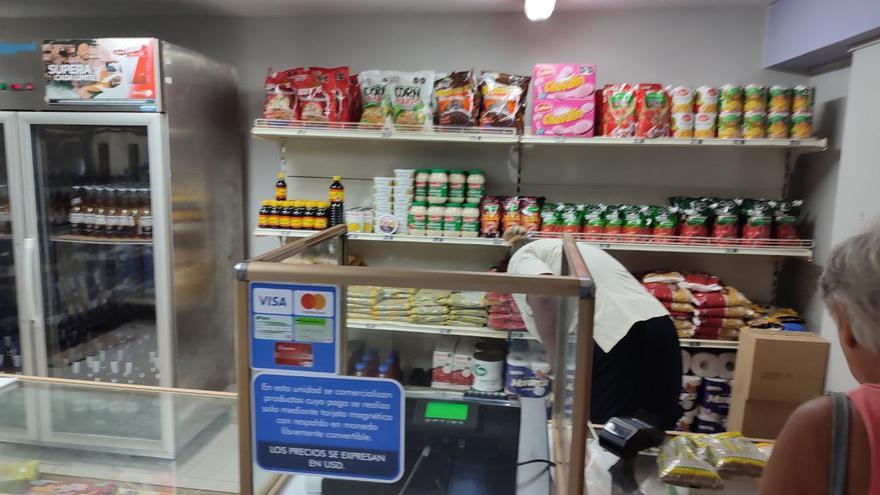
![]() 14ymedio, Natalia López Moya, Havana, 13 October 2023 — “I now pronounce you husband and wife,” was repeated several times a day between those walls. The former Legal Consultancy of Nuevo Vedado in Havana, which welcomed so many marriages between Cubans and foreigners, is now a business immersed in the separation of goods for the privileged foreigners and the National beggars. On the same property there is a market in pesos and another, newly opened, in freely convertible currency. From a distance the building is obvious. Dark wooden blinds cover its facade and alternate with geometric stained glass windows that are not only the most beautiful thing on that block but for several blocks around. The house, which once belonged to a prosperous resident of the area, has been in the hands of the State for decades, and a few years ago it ceased to be used for marriages and the legalization of documents to become a store.
14ymedio, Natalia López Moya, Havana, 13 October 2023 — “I now pronounce you husband and wife,” was repeated several times a day between those walls. The former Legal Consultancy of Nuevo Vedado in Havana, which welcomed so many marriages between Cubans and foreigners, is now a business immersed in the separation of goods for the privileged foreigners and the National beggars. On the same property there is a market in pesos and another, newly opened, in freely convertible currency. From a distance the building is obvious. Dark wooden blinds cover its facade and alternate with geometric stained glass windows that are not only the most beautiful thing on that block but for several blocks around. The house, which once belonged to a prosperous resident of the area, has been in the hands of the State for decades, and a few years ago it ceased to be used for marriages and the legalization of documents to become a store.
An exterior ramp and staircase lead to very different worlds. The one that goes upwards leads to a room where the so-called “modules” are sold in Cuban pesos, which the nearby neighbors can acquire once a month after being aware, for days, of what is announced in the shop window that corresponds to their family’s ration. The staircase leads to the semi-basement, where they only accept foreign currency.
Recently opened, the new freely convertible currency (MLC) store is a small room with only one counter. “It’s not self-service; ask for what you want and I’ll get it,” the employee clarified to a customer who wanted to look closely at a can of tomato sauce located on the shelf behind the woman’s back. Displayed on four shelves were mayonnaise, soy sauce, pasta, cookies, vegetables and toilet paper.
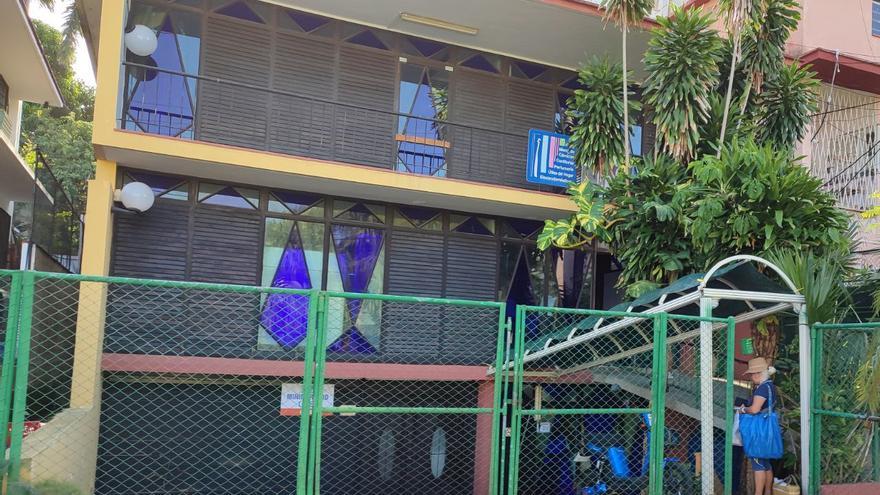
“The offers are quite poor,” complained an old woman who had been looking for chicken sausages. “We don’t have any butcher or frozen food because there is no fridge to store those products,” the employee responded. An exhibition refrigerator contained only beer: the foreign Corona and the national Parranda. A few small packets of instant soda completed the market’s limited catalog.
Outside, some customers who did not know that sales were in foreign currency crowded to enter. The guard, realizing the confusion, warned that the place “is in MLC.” This caused a stampede of long faces. “I thought they weren’t going to continue opening stores of this type if the ones that exist are all out of stock,” grumbled one of the frustrated buyers.
Opened at the end of 2019, initially the MLC stores were intended for the sale of appliances, hardware and furniture, but in mid-2020 they also began to sell food, toiletries and other basic items. Cubans reacted angrily when they found out that the peso shops languished from shortages while the MLC shops had products ranging from vegetable oil to beef.
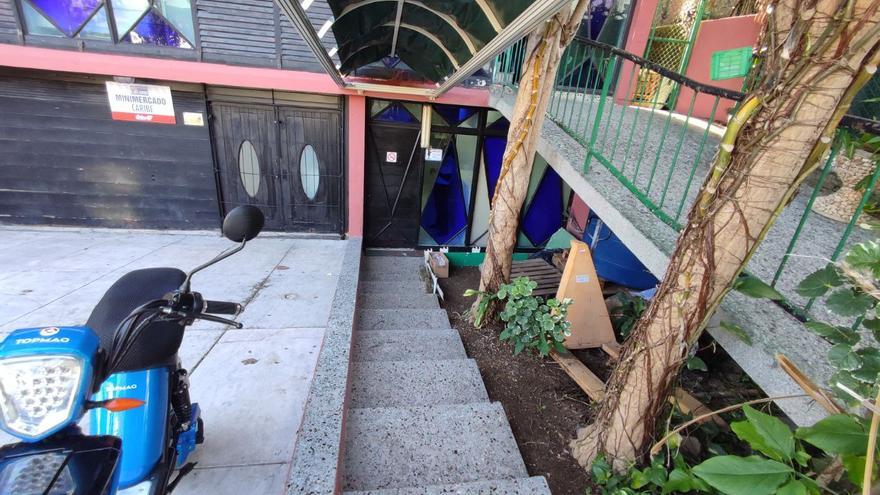
“You would have thought that the people who live in this neighborhood have a lot of money to spend,” another woman grumbled at the doors of the store on 47th Street in Nuevo Vedado. The truth is that the house has had a long history of invoicing in foreign currency. In the 1990s, when the Island opened up to tourism and the economy became dollarized, thousands of Europeans, Canadians and visitors of other nationalities passed through its salons, seeking to formalize their marriage with a Cuban or write a letter of invitation, an indispensable condition for nationals to obtain the exit permit and travel outside the country.
All those procedures had prices of three or even four figures, and every day the place received thousands of dollars for marrying, legalizing documents and writing invitation letters. After the immigration reform that came into force in January 2013, all that very expensive paperwork faltered, and many Cubans preferred to marry their foreign partner in his or her country, and the exit permit was eliminated as a requirement to travel.
“Nothing has changed. Now they get the foreign currency out of us with concentrated soup cubes and cookies for the children’s snacks,” Rosa María, a resident of the neighboring Santa Ana Street, told 14ymedio. “The State always finds a way to take away our dollars.”
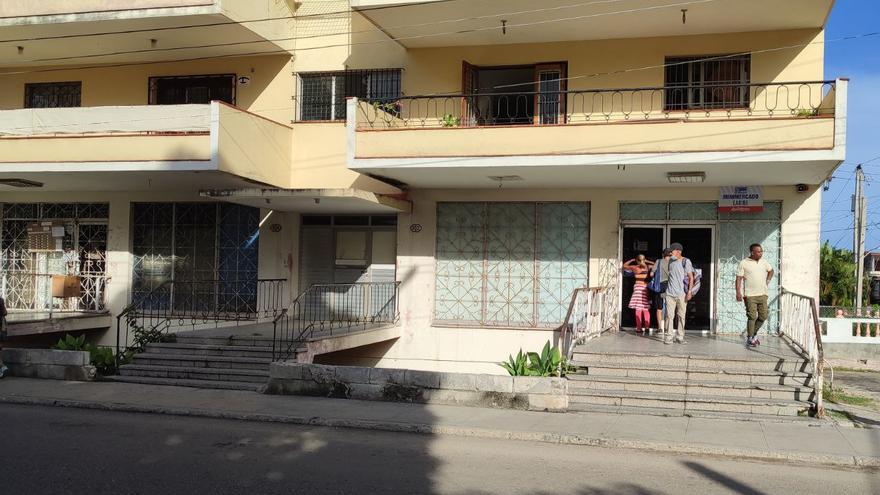
Almost 100 yards away, the story is repeated. La Mariposa, located on Tulipán Street and 26th Avenue, has opened another MLC store this week. The market, with two access doors, now has one door for customers who pay in foreign currency and the other for those who pay in pesos for the basic product modules from the ration program.
Still placing some products on the shelves, the employees of the area in foreign exchange received customers who had just discovered the new market. With poor offerings but a greater number of products than in the old Legal Consultancy, La Mariposa in MLC also has fruit juices, cans of sardines, cream to add to coffee and canned peppers.
“Look, here is the soda that disappeared,” said a young woman, pointing to a 1.5 liter bottle of cola from the national brand Ciego Montero. Next to the container, a Corona beer and another Parranda completed the offer of drinks. “I want two boxes of apple juice,” the woman asked. “It’s 5.45,” the employee replied without mentioning in which currency. A foreign Visa card came out of the customer’s wallet, and she paid the bill.
Behind her, a man bought two 1.5 liter bottles of Parranda beer for 3.70 MLC each. “It’s like carnival beer, but it’s the cheapest on the market right now,” the customer explained to a woman who inquired about the quality of the product. After touching the container, the man complained: “Even though it’s in hard currency, the beer isn’t even cold.” His criticism was immediately answered by the employee: “We have been open for a very short time. We’re just beginning.”
Near the box a sign showed the logos of the magnetic cards that the store accepts and underneath, a blunt phrase: “Prices are expressed in dollars.”
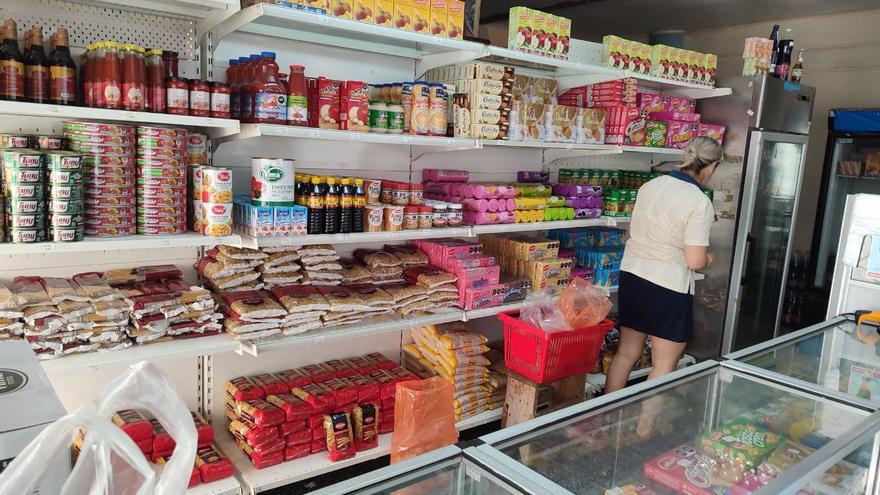
Translated by Regina Anavy
____________
COLLABORATE WITH OUR WORK: The 14ymedio team is committed to practicing serious journalism that reflects Cuba’s reality in all its depth. Thank you for joining us on this long journey. We invite you to continue supporting us by becoming a member of 14ymedio now. Together we can continue transforming journalism in Cuba.
